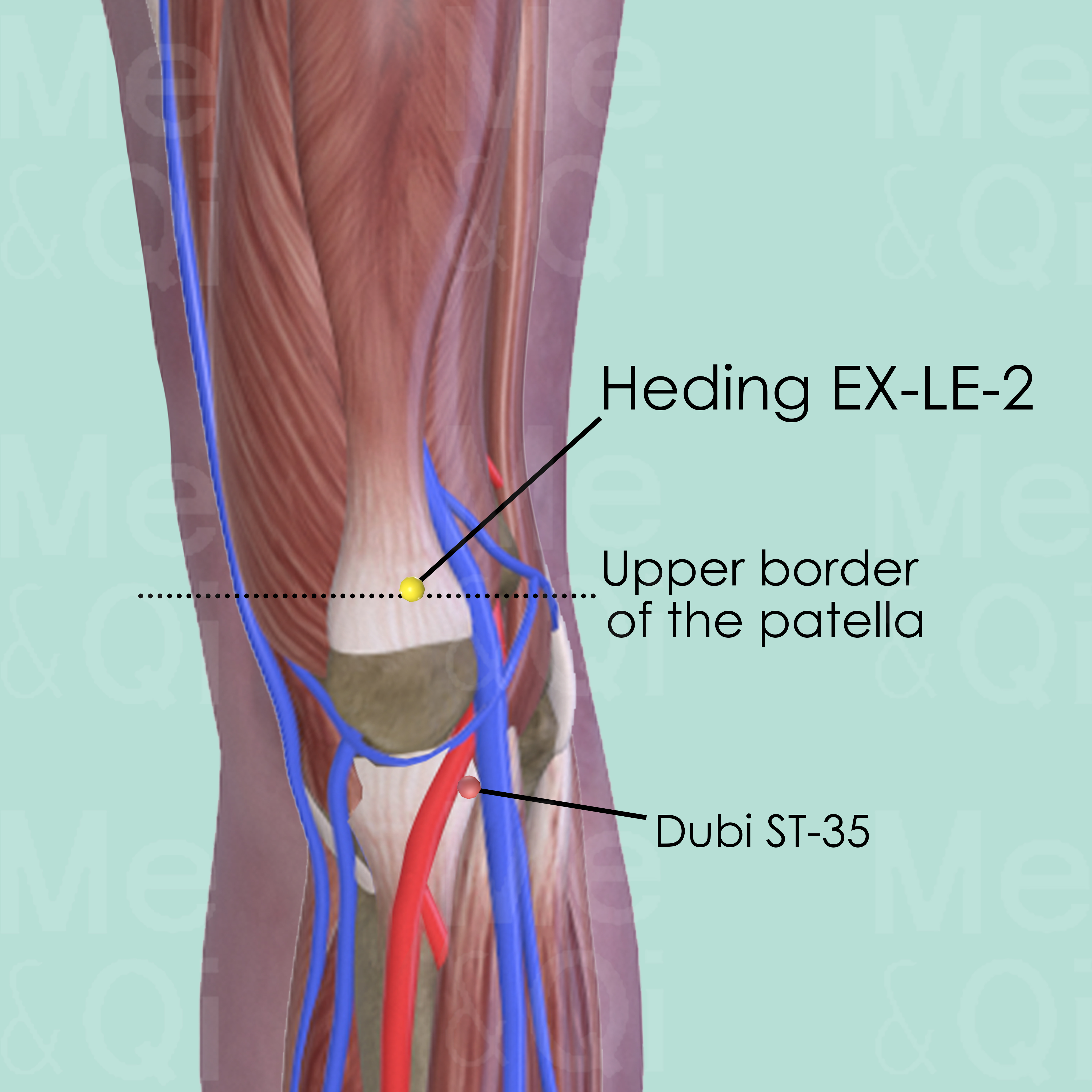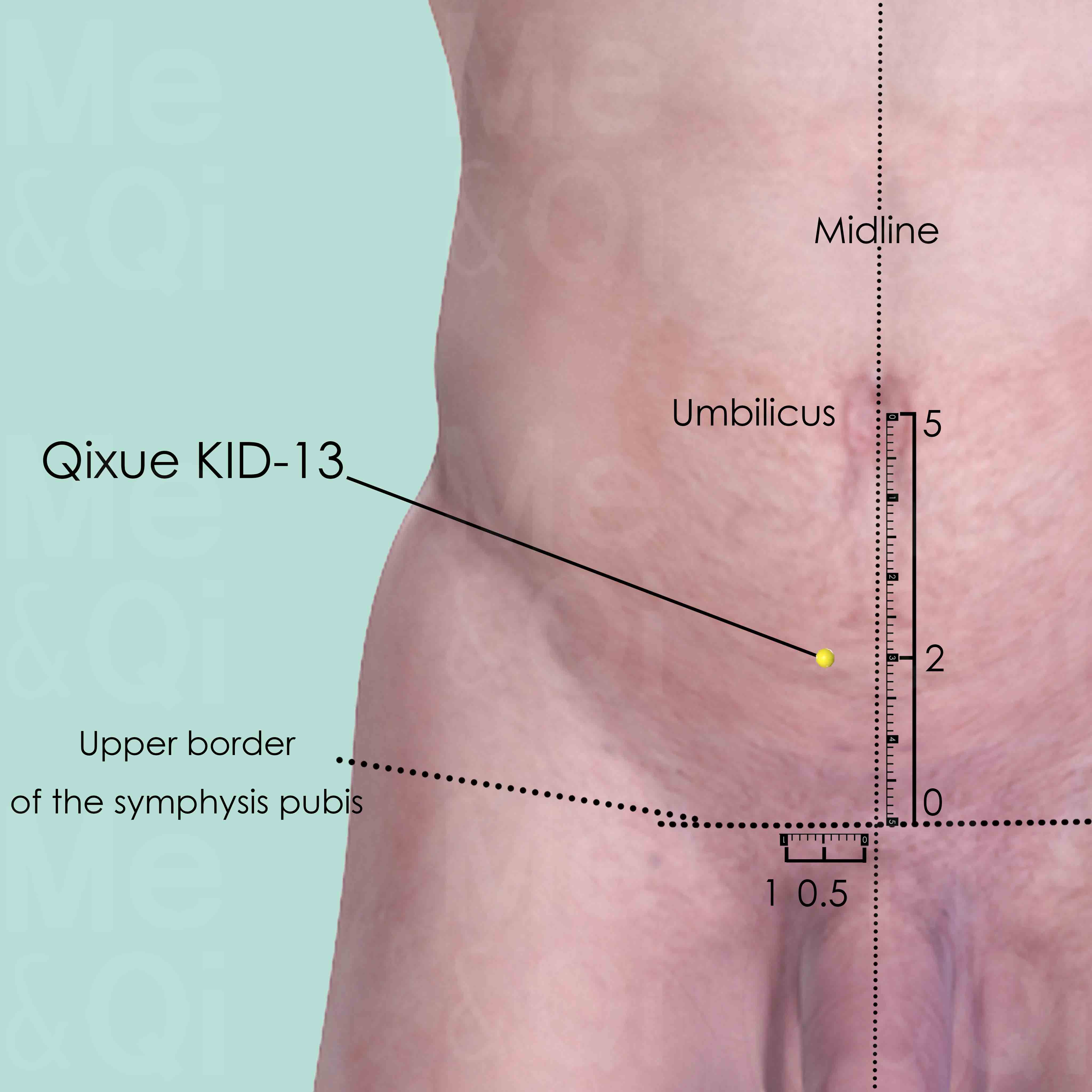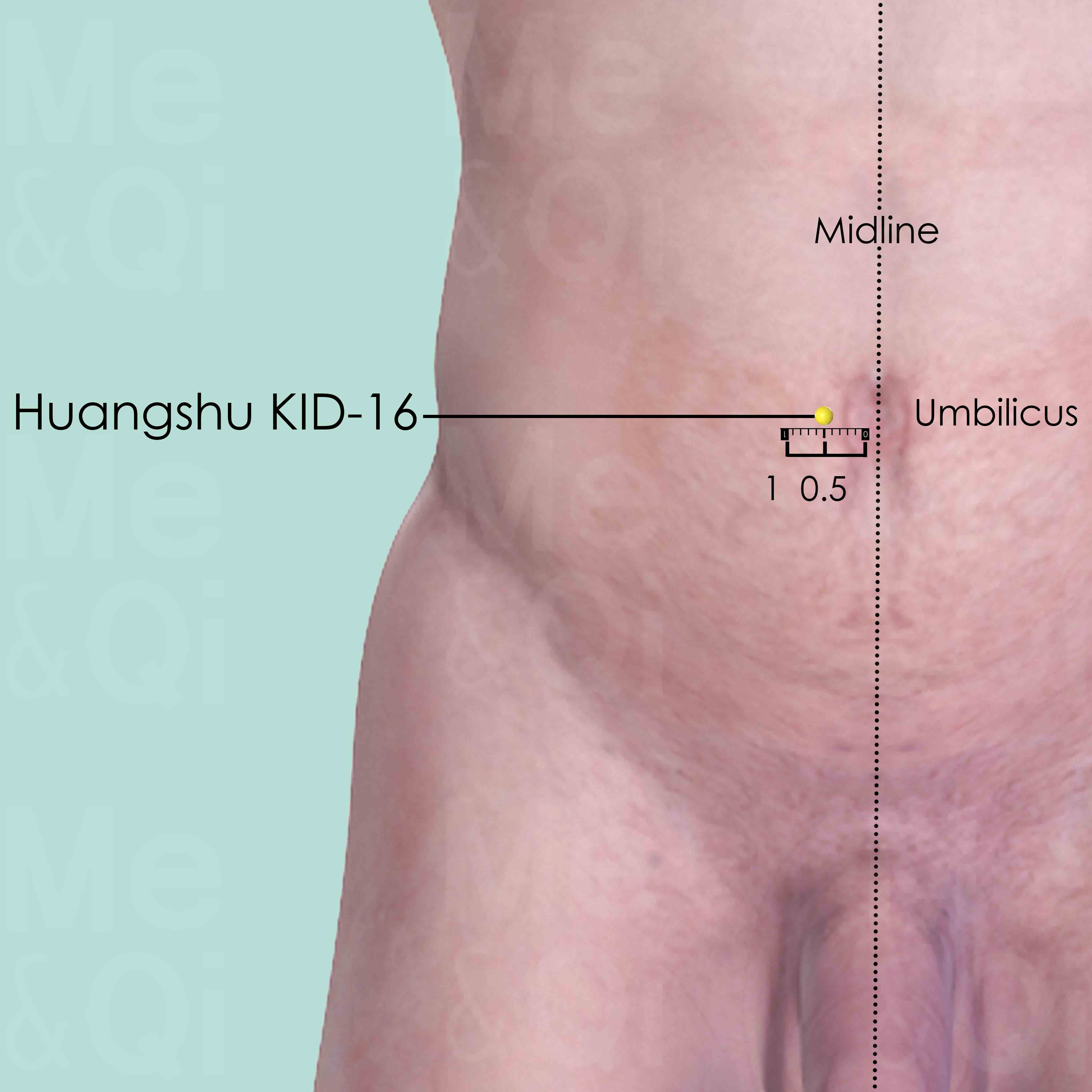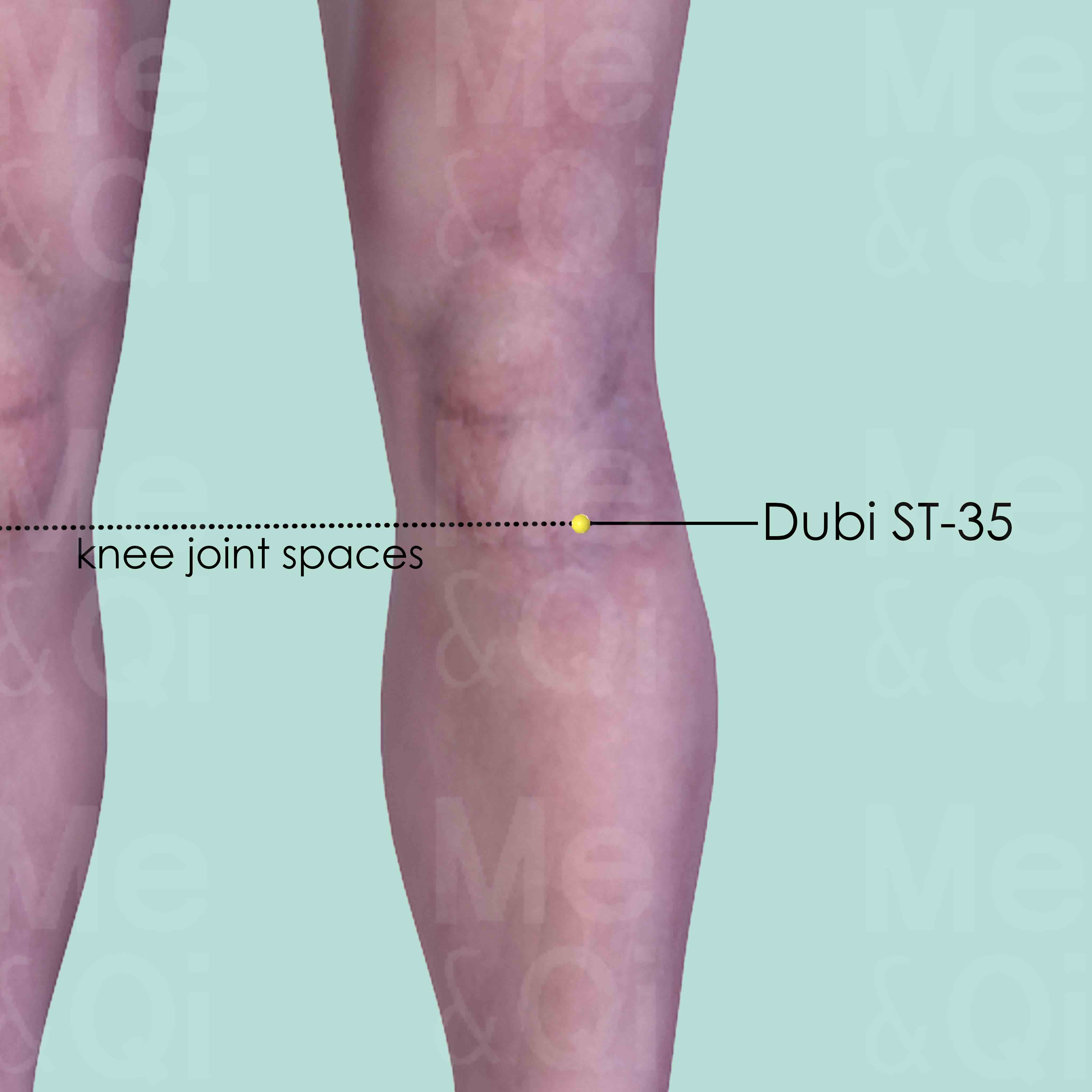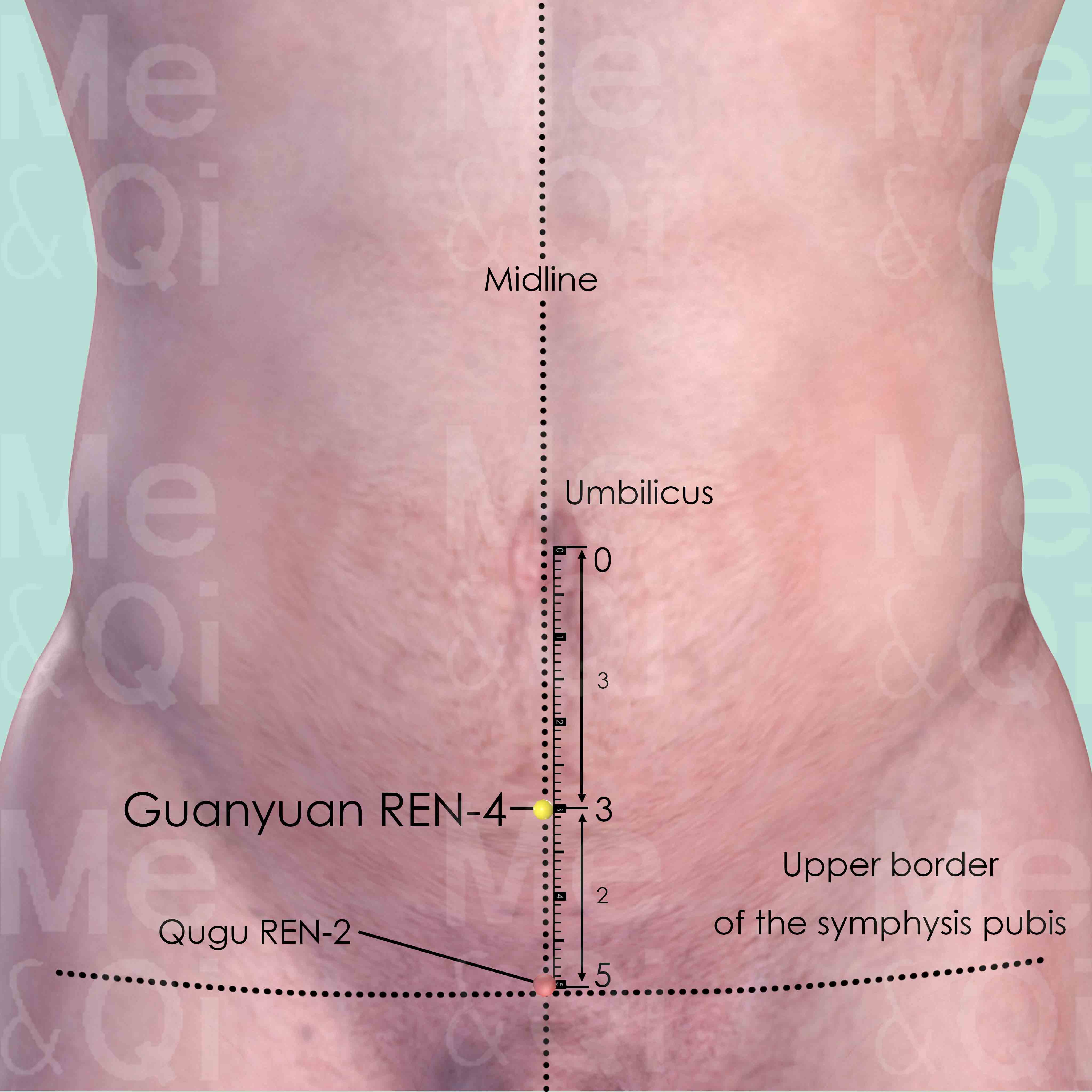Knee Weaknessaccording to TCM
Symptom families: Joint Symptoms, Knee Conditions
Parent symptom: Weak Joints
What is Knee Weakness?
Knee weakness encompasses a sensation of reduced strength and stability in the knees, hindering one's ability to stand, walk, or bear weight comfortably. It may manifest as difficulty in performing movements that require knee support, such as squatting or climbing stairs. While it can occur as a natural consequence of aging, knee weakness often indicates underlying issues ranging from sedentary lifestyle effects to systemic conditions like arthritis.
How does TCM view Knee Weakness?
Traditional Chinese Medicine (TCM) interprets knee weakness as a sign of underlying Deficiencies or blockages in the body's fundamental energies. It is believed that the knees are closely related to the Kidney meridian, so weakness here may suggest a Deficit in Kidney Qi or vitality.
To TCM practitioners, addressing knee weakness involves more than merely alleviating symptoms; it necessitates identifying and treating the specific pattern of disharmony causing the weakness to restore balance and strength.
Root Causes of Knee Weakness in TCM
TCM attributes knee weakness to several internal patterns, often involving Deficiencies in the body's Yin, Yang, or Qi. For example, a Kidney Yin Deficiency may manifest as weakness, coupled with systemic signs like dry mouth and back pain.
Similarly, a fundamental Qi Deficiency can lead to overall weakness and fatigue, impacting the knees. These patterns provide TCM practitioners with a deeper understanding of the condition, informing a holistic treatment strategy that aims to nourish and balance the body's energies.
Explore below more details about what might cause Knee weakness according to TCM.
- By Syndrome
- By Organ
- Yin Deficiency
- Qi Deficiency
- Yang Deficiency
- Yang Excess
- Heat
- View More Causes
- Kidney
- Liver
- Heart
Yin Deficiency
Yin deficiency in TCM is a pattern of disharmony characterized by a depletion of the body's Yin energy, which represents the cooling, moistening, and nurturing aspects of our physiology. This condition often arises from factors like chronic stress, overwork, insufficient rest, or prolonged illness. Symptoms of Yin deficiency can include a sensation of heat, especially in the afternoon or evening, night sweats, insomnia, a dry mouth or throat, and a red tongue with little coating. There might also be a general feeling of restlessness or irritability. Since Yin is essential for balancing the body's active and warm Yang energy, its deficiency leads to a relative excess of Yang, manifesting as heat or dryness symptoms.... see more
Yin Deficiency Patterns That Can Lead to Knee Weakness
Common Symptoms: Dizziness Tinnitus Flushed Cheekbones Night Sweats Restlessness Lower Back Pain Dry Mouth Blurry Vision
| Pattern Name | Relevant Symptoms | Relevant Formulas |
|---|---|---|
| Kidney Yin Deficiency | Weak knees, Perspiration, Back pain, Hearing loss, Dry mouth and throat at night, Lower back pain, Constipation, Scanty and dark urine, Infertility, Premature ejaculation, Generalized fatigue, General weakness, Depression, Anxiety, Heat sensation in palms, Evening heat sensation, Flushed cheekbones, Menopausal hot flashes, Preference for sipping, Evening anxiety... see more | Zuo Gui Yin | Qi Ju Di Huang Wan | Dang Gui Di Huang Yin | Dan Zhi Xiao Yao San |
| Kidney-Deficiency | Weak knees, Scanty menstruation, Pale menstrual flow, Back pain, Knee pain, Dizziness, Tinnitus, Frequent urination, Late menstruation, Chills, Cold extremities... see more | You Gui Wan | Zuo Gui Wan | Er Zhi Wan | Liang Di Tang |
| Deficiency of the Liver and Kidney Yin | Weak knees, Sore knees, Lower back pain, Knee weakness, Dry mouth, Dry tongue, Dizziness, Blurry vision, Insomnia, Vivid dreaming, Hair graying... see more | Er Zhi Wan |
| Disharmony between Heart and Kidneys | Weakness and aching in the knees, Dizziness, Tinnitus, Insomnia, Palpitations, Poor memory, Lower back pain, Knee pain, Night sweats, Constipation, Menopausal hot flashes... see more | Tian Wang Bu Xin Dan | Liu Wei Di Huang Wan |
Qi Deficiency
Qi Deficiency in TCM is like running low on battery power. Qi is the vital energy that powers every function in your body. When there's a Qi Deficiency, it means your body doesn't have enough of this essential energy. This can make you feel tired all the time, weak, or even cause shortness of breath. It's similar to how you feel when you haven't had enough sleep or nutritious food. Your body just doesn't have the energy it needs to perform at its best. Unlike modern medicine, which often focuses on specific physical causes for fatigue and weakness, TCM views Qi Deficiency as an overall energy depletion that affects your entire well-being, and it seeks to replenish and balance this vital energy.... see more
Qi Deficiency Patterns That Can Lead to Knee Weakness
Common Symptoms: Generalized Fatigue Frequent Urination Nocturnal Emission Cold Extremities Lower Back Weakness General Weakness Weak Voice Low Energy
| Pattern Name | Relevant Symptoms | Relevant Formulas |
|---|---|---|
| Qi Deficiency | Weak knees, General weakness, Weak voice, Generalized fatigue, Low energy, Reluctance to speak, Spontaneous sweat, Frequent colds or flu, Lack of appetite, Diarrhea, Shortness of breath... see more | Bu Zhong Yi Qi Tang | Gui Pi Tang | Gu Ben Zhi Beng Tang |
| Kidney Qi not Firm | Weakness and aching in the knees, Lower back pain, Lower back weakness, Polyuria, Weak urine stream, Enuresis, Nocturnal emission, Generalized fatigue, Chills, Cold extremities, White vaginal discharge, Bearing down sensation in abdomen, Recurrent miscarriage... see more | You Gui Wan | Jin Suo Gu Jing Wan | Fu Tu Dan | Qing E Wan | Tu Si Zi Wan |
Yang Deficiency
Yang deficiency in TCM refers to a state where the body's Yang energy, which is responsible for warmth, activity, and function, is weakened or diminished. This pattern of disharmony often arises from chronic illness, aging, or inherent constitutional weakness. Symptoms of Yang deficiency are typically associated with cold and sluggishness, such as a feeling of coldness, cold extremities, pale complexion, low energy or fatigue, and a desire for warmth. Digestive issues like poor appetite, loose stools, and water retention can also be indicative of Yang deficiency.... see more
Yang Deficiency Patterns That Can Lead to Knee Weakness
| Pattern Name | Relevant Symptoms | Relevant Formulas |
|---|---|---|
| Kidney Yang Deficiency | Weak knees, Weakness and aching in the knees, Lower back pain, Dizziness, Tinnitus, Weak and cold knees, Lower back coldness, Chills, Weak legs, Bright pale face, Generalized fatigue, General weakness, Leg edema, Female infertility, Diarrhea, Depression, Erectile dysfunction, Premature ejaculation, Oligospermia, Low sex drive, Pale and abudant urination, Constipation... see more | You Gui Wan | Er Xian Tang |
Yang Excess
Yang Excess in TCM refers to a state where there is an overabundance of Yang energy, leading to symptoms of heat and hyperactivity in the body. This pattern of disharmony often arises from factors like stress, excessive physical activity, overconsumption of spicy or heating foods, or an internal imbalance that causes Yang to flare up. Symptoms of Yang Excess include a feeling of heat, red face, irritability, restlessness, thirst, constipation, and a rapid, forceful pulse. Treatment in TCM for Yang Excess aims to cool down and subdue the excessive Yang while nurturing Yin energy to restore balance.... see more
Yang Excess Patterns That Can Lead to Knee Weakness
| Pattern Name | Relevant Symptoms | Relevant Formulas |
|---|---|---|
| Liver Yang Rising | Soreness and weakness of the knees, Headaches, Dizziness, Tinnitus, Deafness, Blurry vision, Dry mouth, Dry throat, Insomnia, Irritability, Exhaustion, Anger, Stiff neck, Shoulder stiffness, Stiff upper back... see more | Zhen Xin An Shen Tang | Qi Ju Di Huang Wan | Liu Wei Di Huang Wan | Tian Ma Gou Teng Yin | Ling Jiao Gou Teng Tang | Da Chai Hu Tang | Zhen Zhu Mu Wan |
Heat
In TCM "Heat" signifies an excess of Yang energy, leading to an imbalance where heat predominates over the body's cool Yin aspects. This condition is metaphorically akin to an internal over-heating. Symptoms indicative of Heat can include feelings of warmth, fever, sweating, irritability, red face, thirst with a preference for cold drinks, and a rapid pulse. The tongue may appear red with a yellow coating. Unlike the common interpretation of heat in terms of temperature, in TCM, it represents a state of hyperactivity or inflammation in the body.... see more
Heat Patterns That Can Lead to Knee Weakness
| Pattern Name | Relevant Symptoms | Relevant Formulas |
|---|---|---|
| Disharmony between Heart and Kidneys | Weakness and aching in the knees, Dizziness, Tinnitus, Insomnia, Palpitations, Poor memory, Lower back pain, Knee pain, Night sweats, Constipation, Menopausal hot flashes... see more | Tian Wang Bu Xin Dan | Liu Wei Di Huang Wan |
Kidney
In TCM the Kidneys are regarded as the body's most fundamental reservoir of Essence, known as Jing, which influences growth, reproduction, and aging. They are not just organs for filtering blood, but a holistic system governing vital life forces. When the Kidneys malfunction in TCM, it can manifest as a variety of health issues, such as chronic fatigue, reproductive problems, imbalances in fluid metabolism leading to edema or dryness, lower back pain, and a sense of fear or insecurity.... see more
Kidney Patterns That Can Lead to Knee Weakness
Common Symptoms: Dizziness Lower Back Pain Back Pain Knee Pain Tinnitus Night Sweats Nocturnal Emission Scanty Menstruation
| Pattern Name | Relevant Symptoms | Relevant Formulas |
|---|---|---|
| Kidney Yang Deficiency | Weak knees, Weakness and aching in the knees, Lower back pain, Dizziness, Tinnitus, Weak and cold knees, Lower back coldness, Chills, Weak legs, Bright pale face, Generalized fatigue, General weakness, Leg edema, Female infertility, Diarrhea, Depression, Erectile dysfunction, Premature ejaculation, Oligospermia, Low sex drive, Pale and abudant urination, Constipation... see more | You Gui Wan | Er Xian Tang |
| Kidney Yin Deficiency | Weak knees, Perspiration, Back pain, Hearing loss, Dry mouth and throat at night, Lower back pain, Constipation, Scanty and dark urine, Infertility, Premature ejaculation, Generalized fatigue, General weakness, Depression, Anxiety, Heat sensation in palms, Evening heat sensation, Flushed cheekbones, Menopausal hot flashes, Preference for sipping, Evening anxiety... see more | Zuo Gui Yin | Qi Ju Di Huang Wan | Dang Gui Di Huang Yin | Dan Zhi Xiao Yao San |
| Kidney Qi not Firm | Weakness and aching in the knees, Lower back pain, Lower back weakness, Polyuria, Weak urine stream, Enuresis, Nocturnal emission, Generalized fatigue, Chills, Cold extremities, White vaginal discharge, Bearing down sensation in abdomen, Recurrent miscarriage... see more | You Gui Wan | Jin Suo Gu Jing Wan | Fu Tu Dan | Qing E Wan | Tu Si Zi Wan |
| Kidney-Deficiency | Weak knees, Scanty menstruation, Pale menstrual flow, Back pain, Knee pain, Dizziness, Tinnitus, Frequent urination, Late menstruation, Chills, Cold extremities... see more | You Gui Wan | Zuo Gui Wan | Er Zhi Wan | Liang Di Tang |
| Deficiency of the Liver and Kidney Yin | Weak knees, Sore knees, Lower back pain, Knee weakness, Dry mouth, Dry tongue, Dizziness, Blurry vision, Insomnia, Vivid dreaming, Hair graying... see more | Er Zhi Wan |
| Disharmony between Heart and Kidneys | Weakness and aching in the knees, Dizziness, Tinnitus, Insomnia, Palpitations, Poor memory, Lower back pain, Knee pain, Night sweats, Constipation, Menopausal hot flashes... see more | Tian Wang Bu Xin Dan | Liu Wei Di Huang Wan |
Liver
In TCM the Liver is viewed as the organ responsible for the smooth flow of Qi, Blood, and emotions throughout the body. It plays a key role in regulating mood, storing blood, supporting digestion, and ensuring the health of tendons and eyes. When the Liver malfunctions or is imbalanced in TCM, it can lead to a range of issues such as irritability, mood swings, menstrual irregularities, eye problems, and muscular stiffness or pain. A malfunctioning Liver in TCM reflects not only physical disturbances but also emotional and mental disharmony, emphasizing the holistic approach of TCM in addressing health and wellness.... see more
Liver Patterns That Can Lead to Knee Weakness
Common Symptoms: Sore Knees Dry Mouth Dizziness Blurry Vision Insomnia Lower Back Pain Dry Tongue Vivid Dreaming
| Pattern Name | Relevant Symptoms | Relevant Formulas |
|---|---|---|
| Liver Yang Rising | Soreness and weakness of the knees, Headaches, Dizziness, Tinnitus, Deafness, Blurry vision, Dry mouth, Dry throat, Insomnia, Irritability, Exhaustion, Anger, Stiff neck, Shoulder stiffness, Stiff upper back... see more | Zhen Xin An Shen Tang | Qi Ju Di Huang Wan | Liu Wei Di Huang Wan | Tian Ma Gou Teng Yin | Ling Jiao Gou Teng Tang | Da Chai Hu Tang | Zhen Zhu Mu Wan |
| Deficiency of the Liver and Kidney Yin | Weak knees, Sore knees, Lower back pain, Knee weakness, Dry mouth, Dry tongue, Dizziness, Blurry vision, Insomnia, Vivid dreaming, Hair graying... see more | Er Zhi Wan |
Heart
In TCM the Heart is considered the "emperor" of all organs, primarily responsible for governing Blood and housing the mind, known as "Shen." It plays a crucial role in maintaining mental-emotional equilibrium and controlling the circulation of Qi and blood throughout the body. When the Heart is imbalanced or malfunctions in TCM, it can lead to a range of issues like heart palpitations, insomnia, dream-disturbed sleep, anxiety, and a flushed complexion. Emotional disturbances such as excessive joy or lack of joy are also seen as signs of Heart disharmony. These symptoms reflect not just physical heart conditions but also the state of one's Shen, indicating the interconnectedness of physical and emotional well-being in TCM.... see more
Heart Patterns That Can Lead to Knee Weakness
| Pattern Name | Relevant Symptoms | Relevant Formulas |
|---|---|---|
| Disharmony between Heart and Kidneys | Weakness and aching in the knees, Dizziness, Tinnitus, Insomnia, Palpitations, Poor memory, Lower back pain, Knee pain, Night sweats, Constipation, Menopausal hot flashes... see more | Tian Wang Bu Xin Dan | Liu Wei Di Huang Wan |
TCM Herbal Formulas for Knee Weakness
In the realm of TCM, treatment for knee weakness often includes herbal formulas aligned with the identified patterns of disharmony. Formulas such as Zuo Gui Yin and You Gui Wan are frequently recommended for Kidney Deficiencies, containing key herbs like Prepared rehmannia that nourish Yin or warm Yang, respectively. These formulas are carefully chosen to support the body's innate energies, address the specific type of deficiency, and foster resilience in the knee joints.
Explore below some TCM herbal formulas used to address knee weakness, organized by cause and by formula type.
- By Cause
- By Formula Type
- Yin Deficiency
- Qi Deficiency
- Yang Deficiency
- Yang Excess
- Heat
- View More Causes
- Formulas that nourish yin and tonify
- Formulas that warm yang and tonify
- Formulas that nourish the heart and calm the mind
- Formulas that tonify qi and blood
- Formulas that tonify yin and yang
- Formulas that pacify and extinguish internal wind
- Formulas that secure essence and stop enuresis
- Formulas that tonify qi
- Formulas that tonify blood
- Formulas that clear liver-Heat
- Formulas that release the exterior and purge the interior
- Formulas that sedate and calm the mind
Top Formula for Yin Deficiency:
Er Zhi Wan
Suitable for Yin Deficiency patterns that may cause knee weakness, such as Kidney-Deficiency or Deficiency of the Liver and Kidney Yin
Learn moreAll Formulas Recommended for Knee Weakness Caused by Yin Deficiency
| Formula | Patterns Suitable For |
|---|---|
| Er Zhi Wan | Kidney-Deficiency, Deficiency of the Liver and Kidney Yin |
| You Gui Wan | Kidney-Deficiency |
| Qi Ju Di Huang Wan | Kidney Yin Deficiency |
| Liu Wei Di Huang Wan | Disharmony between Heart and Kidneys |
| Zuo Gui Wan | Kidney-Deficiency |
| Liang Di Tang | Kidney-Deficiency |
| Zuo Gui Yin | Kidney Yin Deficiency |
| Dang Gui Di Huang Yin | Kidney Yin Deficiency |
| Dan Zhi Xiao Yao San | Kidney Yin Deficiency |
| Tian Wang Bu Xin Dan | Disharmony between Heart and Kidneys |
Top Formula for Qi Deficiency:
You Gui Wan
Suitable for Qi Deficiency patterns that may cause knee weakness, such as Kidney Qi not Firm
Learn moreAll Formulas Recommended for Knee Weakness Caused by Qi Deficiency
| Formula | Patterns Suitable For |
|---|---|
| You Gui Wan | Kidney Qi not Firm |
| Bu Zhong Yi Qi Tang | Qi Deficiency |
| Gui Pi Tang | Qi Deficiency |
| Gu Ben Zhi Beng Tang | Qi Deficiency |
| Jin Suo Gu Jing Wan | Kidney Qi not Firm |
| Fu Tu Dan | Kidney Qi not Firm |
| Qing E Wan | Kidney Qi not Firm |
| Tu Si Zi Wan | Kidney Qi not Firm |
Top Formula for Yang Deficiency:
You Gui Wan
Suitable for Yang Deficiency patterns that may cause knee weakness, such as Kidney Yang Deficiency
Learn moreAll Formulas Recommended for Knee Weakness Caused by Yang Deficiency
| Formula | Patterns Suitable For |
|---|---|
| You Gui Wan | Kidney Yang Deficiency |
| Er Xian Tang | Kidney Yang Deficiency |
Top Formula for Yang Excess:
Qi Ju Di Huang Wan
Suitable for Yang Excess patterns that may cause knee weakness, such as Liver Yang Rising
Learn moreAll Formulas Recommended for Knee Weakness Caused by Yang Excess
| Formula | Patterns Suitable For |
|---|---|
| Qi Ju Di Huang Wan | Liver Yang Rising |
| Liu Wei Di Huang Wan | Liver Yang Rising |
| Zhen Xin An Shen Tang | Liver Yang Rising |
| Tian Ma Gou Teng Yin | Liver Yang Rising |
| Ling Jiao Gou Teng Tang | Liver Yang Rising |
| Da Chai Hu Tang | Liver Yang Rising |
| Zhen Zhu Mu Wan | Liver Yang Rising |
Top Formula for Heat:
Liu Wei Di Huang Wan
Suitable for Heat patterns that may cause knee weakness, such as Disharmony between Heart and Kidneys
Learn moreAll Formulas Recommended for Knee Weakness Caused by Heat
| Formula | Patterns Suitable For |
|---|---|
| Liu Wei Di Huang Wan | Disharmony between Heart and Kidneys |
| Tian Wang Bu Xin Dan | Disharmony between Heart and Kidneys |
Formulas that nourish Yin and tonify
These formulas are suitable for some knee weakness-causing patterns like Kidney-Deficiency or Deficiency of the Liver and Kidney Yin.
One such formula is Er Zhi Wan, with glossy privet fruit as a key herb.
Other formulas of this category are listed in the table below.
All "formulas that nourish yin and tonify" recommended for knee weakness
| Formula | Patterns Suitable For (if applicable) |
|---|---|
| Er Zhi Wan | Kidney-Deficiency, Deficiency of the Liver and Kidney Yin |
| Qi Ju Di Huang Wan | Kidney Yin Deficiency, Liver Yang Rising |
| Liu Wei Di Huang Wan | Disharmony between Heart and Kidneys, Liver Yang Rising |
| Zuo Gui Wan | Kidney-Deficiency |
| Liang Di Tang | Kidney-Deficiency |
| Zuo Gui Yin | Kidney Yin Deficiency |
Formulas that warm Yang and tonify
These formulas are suitable for some knee weakness-causing patterns like Kidney-Deficiency or Kidney Yang Deficiency.
One such formula is You Gui Wan, with prepared aconite as a key herb.
Other formulas of this category are listed in the table below.
All "formulas that warm yang and tonify" recommended for knee weakness
| Formula | Patterns Suitable For (if applicable) |
|---|---|
| You Gui Wan | Kidney-Deficiency, Kidney Qi not Firm, Kidney Yang Deficiency |
| Qing E Wan | Kidney Qi not Firm |
| Tu Si Zi Wan | Kidney Qi not Firm |
| Ji Sheng Shen Qi Wan | Not applicable |
Formulas that nourish the Heart and calm the Mind
These formulas are suitable for some knee weakness-causing patterns like Liver Yang Rising.
One such formula is Zhen Xin An Shen Tang
Other formulas of this category are listed in the table below.
All "formulas that nourish the heart and calm the mind" recommended for knee weakness
| Formula | Patterns Suitable For (if applicable) |
|---|---|
| Zhen Xin An Shen Tang | Liver Yang Rising |
| Tian Wang Bu Xin Dan | Disharmony between Heart and Kidneys |
Formulas that tonify Qi and Blood
These formulas are suitable for some knee weakness-causing patterns like Qi Deficiency.
One such formula is Gui Pi Tang, with ginseng as a key herb.
Other formulas of this category are listed in the table below.
All "formulas that tonify qi and blood" recommended for knee weakness
| Formula | Patterns Suitable For (if applicable) |
|---|---|
| Gui Pi Tang | Qi Deficiency |
| Gu Ben Zhi Beng Tang | Qi Deficiency |
Formulas that tonify Yin and Yang
These formulas are suitable for some knee weakness-causing patterns like Kidney Yang Deficiency.
One such formula is Er Xian Tang, with curculigo rhizome as a key herb.
Other formulas of this category are listed in the table below.
All "formulas that tonify yin and yang" recommended for knee weakness
| Formula | Patterns Suitable For (if applicable) |
|---|---|
| Er Xian Tang | Kidney Yang Deficiency |
| Qi Bao Mei Ran Dan | Not applicable |
Formulas that pacify and extinguish Internal Wind
These formulas are suitable for some knee weakness-causing patterns like Liver Yang Rising.
One such formula is Tian Ma Gou Teng Yin, with gastrodia rhizome as a key herb.
Other formulas of this category are listed in the table below.
All "formulas that pacify and extinguish internal wind" recommended for knee weakness
| Formula | Patterns Suitable For (if applicable) |
|---|---|
| Tian Ma Gou Teng Yin | Liver Yang Rising |
| Ling Jiao Gou Teng Tang | Liver Yang Rising |
Formulas that secure Essence and stop enuresis
These formulas are suitable for some knee weakness-causing patterns like Kidney Qi not Firm.
One such formula is Jin Suo Gu Jing Wan, with milkvetch seeds as a key herb.
Other formulas of this category are listed in the table below.
All "formulas that secure essence and stop enuresis" recommended for knee weakness
| Formula | Patterns Suitable For (if applicable) |
|---|---|
| Jin Suo Gu Jing Wan | Kidney Qi not Firm |
| Fu Tu Dan | Kidney Qi not Firm |
Formulas that tonify Qi
These formulas are suitable for some knee weakness-causing patterns like Qi Deficiency.
One such formula is Bu Zhong Yi Qi Tang, with milkvetch root as a key herb.
Formulas that tonify Blood
These formulas are suitable for some knee weakness-causing patterns like Kidney Yin Deficiency.
One such formula is Dang Gui Di Huang Yin, with dong quai as a key herb.
Formulas that clear Liver-Heat
These formulas are suitable for some knee weakness-causing patterns like Kidney Yin Deficiency.
One such formula is Dan Zhi Xiao Yao San, with mudan peony bark as a key herb.
Formulas that release the Exterior and purge the Interior
These formulas are suitable for some knee weakness-causing patterns like Liver Yang Rising.
One such formula is Da Chai Hu Tang, with bupleurum root as a key herb.
Formulas that sedate and calm the Mind
These formulas are suitable for some knee weakness-causing patterns like Liver Yang Rising.
One such formula is Zhen Zhu Mu Wan, with mother of pearl as a key herb.
Acupoints for Knee Weakness
TCM also employs acupuncture as a key therapeutic modality for knee weakness. Acupoints such as Heding EX-LE-2 and Xiyan EX-LE-5 are selected to promote Qi and Blood circulation in the knee. In addition, points like Guanyuan REN-4 on the Directing Vessel and Yangchi TB-4 on the Triple Burner Channel are utilized to nourish the body's Yin, support Qi, and remove obstructions from the energy channels, thereby targeting the energetic root of knee weakness.
Explore below some acupoints used to address knee weakness, organized by meridian.
- By Meridian
- Extra Points: Lower Extremities (EX-LE)
- Kidney Channel
- Stomach Channel
- Directing Vessel
- Triple Burner Channel
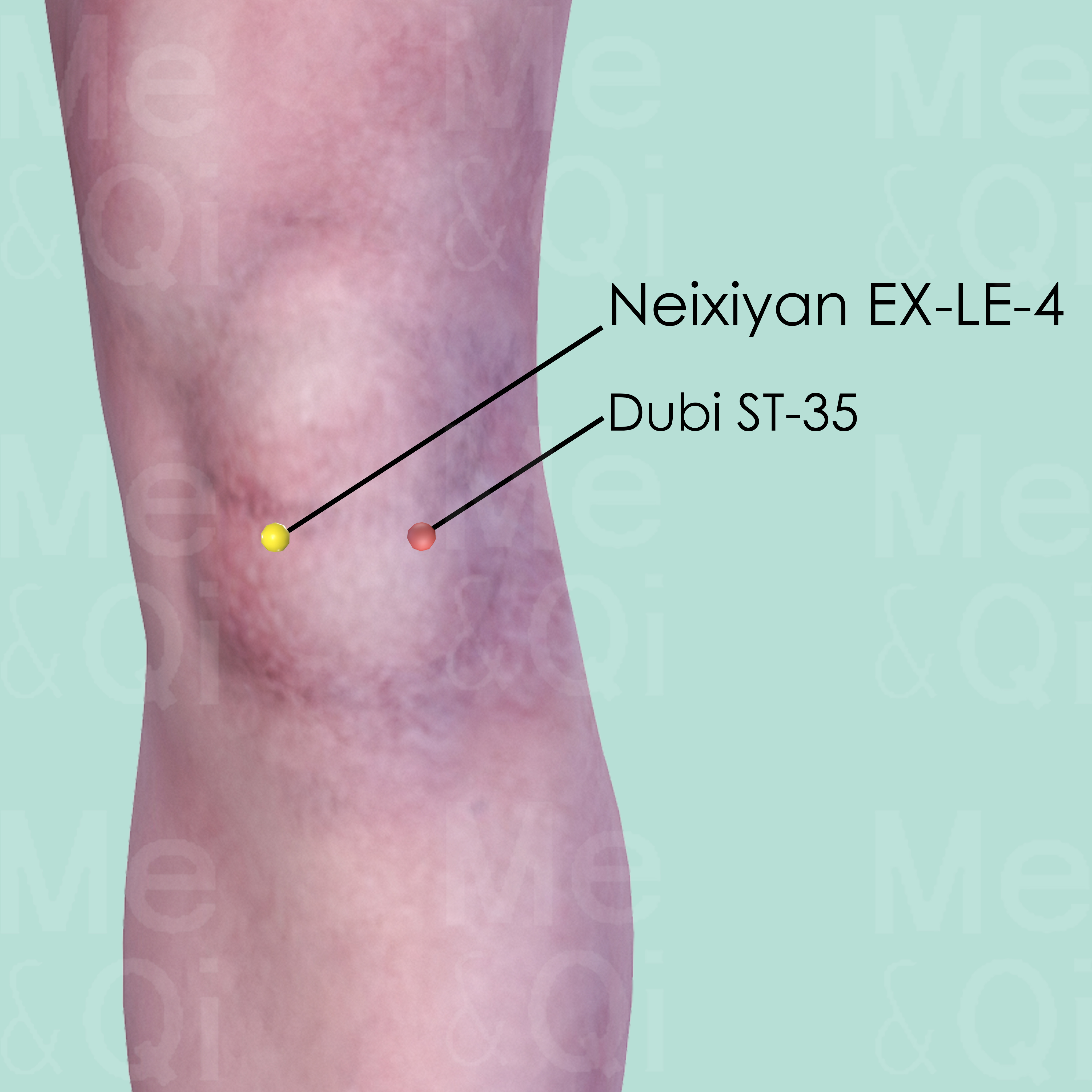
Neixiyan EX-LE-4
With the knee flexed, inferior to the patella, in a depression medial to the patellar ligament. Dubi ST-35 is at the same level, in a depression lateral to the patellar ligament. Both points form the Extra point of Xiyan EX-LE-5.
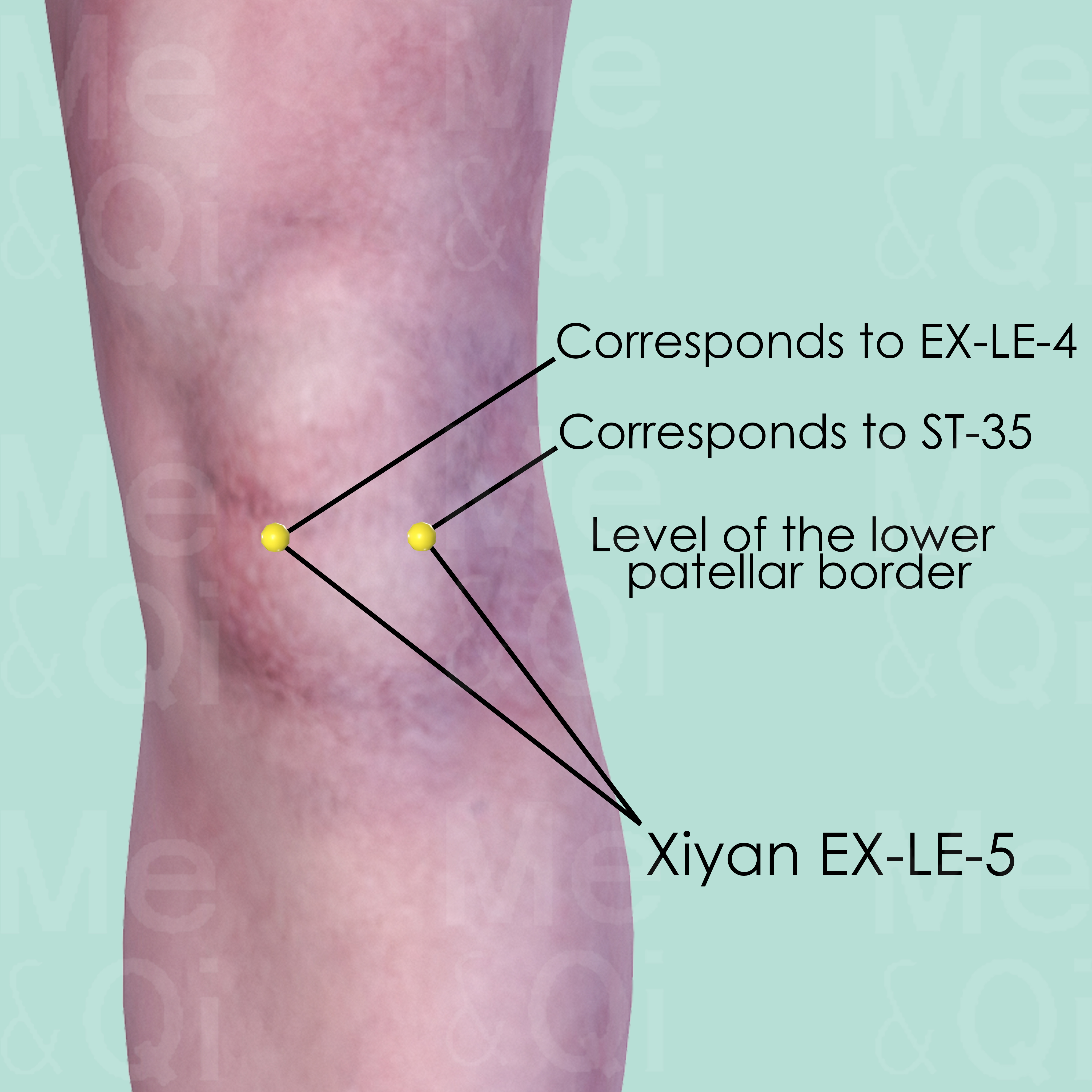
Xiyan EX-LE-5
This is a group of 2 points, composed of Dubi ST-35 and Neixiyan EX-LE-4. Both are located inferior to the patella, medial and lateral to the patellar ligament. Dubi ST-35 is the lateral one, while Neixiyan EX-LE-4 is the medial one.
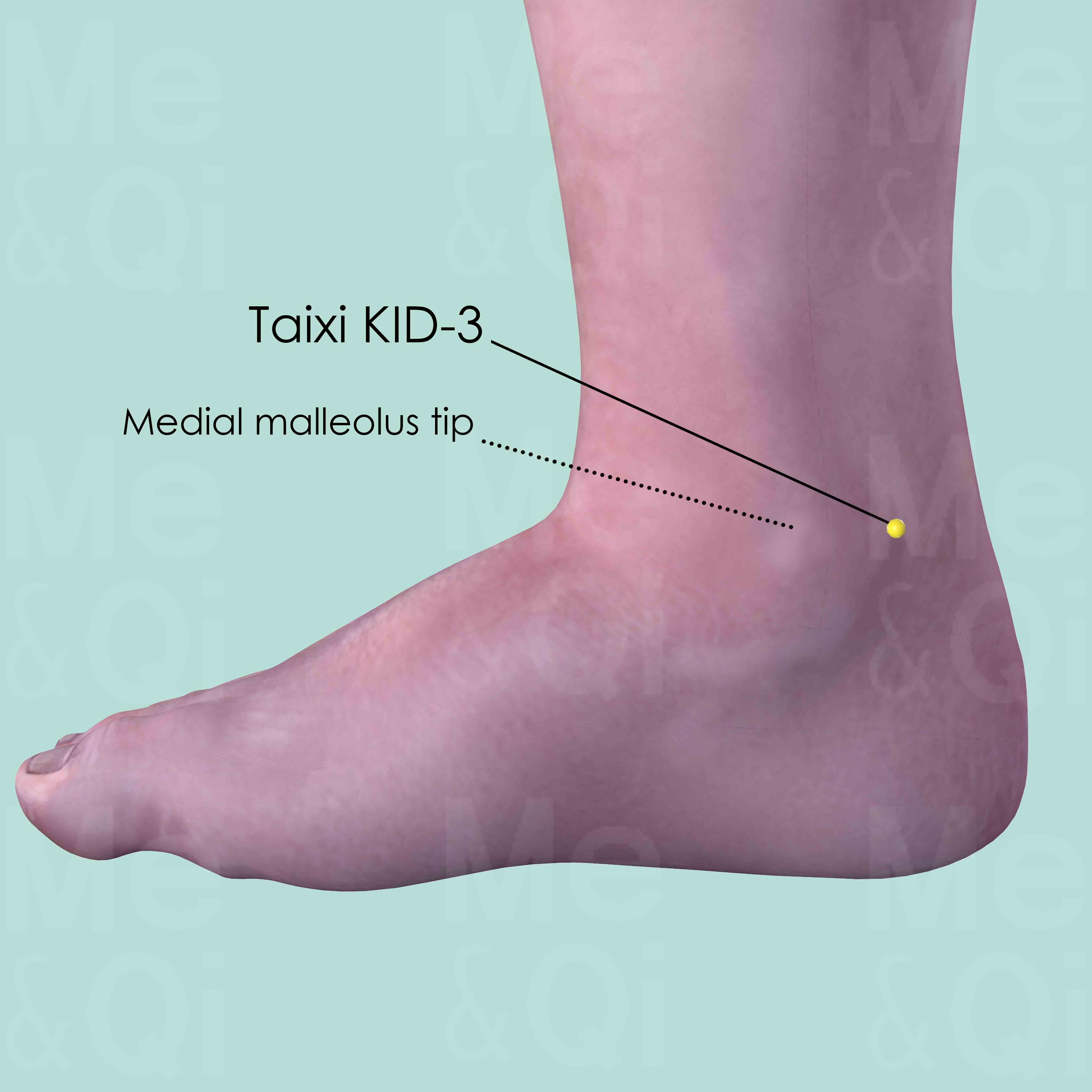
Taixi KID-3
In the depression between the medial malleolus tip and Achilles tendon (Calcaneal tendon), level with the tip of the medial malleolus.
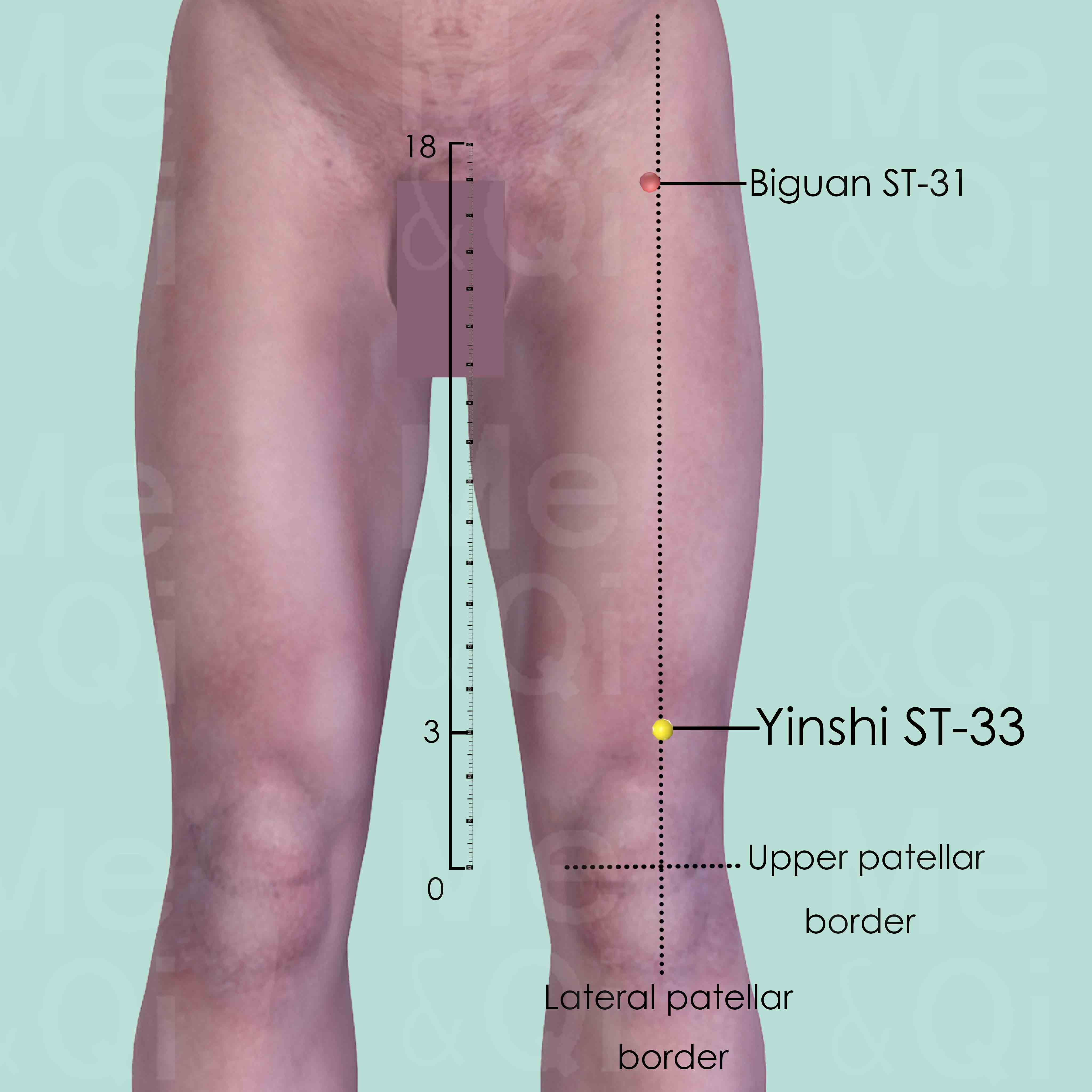
Yinshi ST-33
3 cun above the upper-lateral border of the patella, on a line between the lateral patellar border and the anterior superior iliac spine (ASIS).
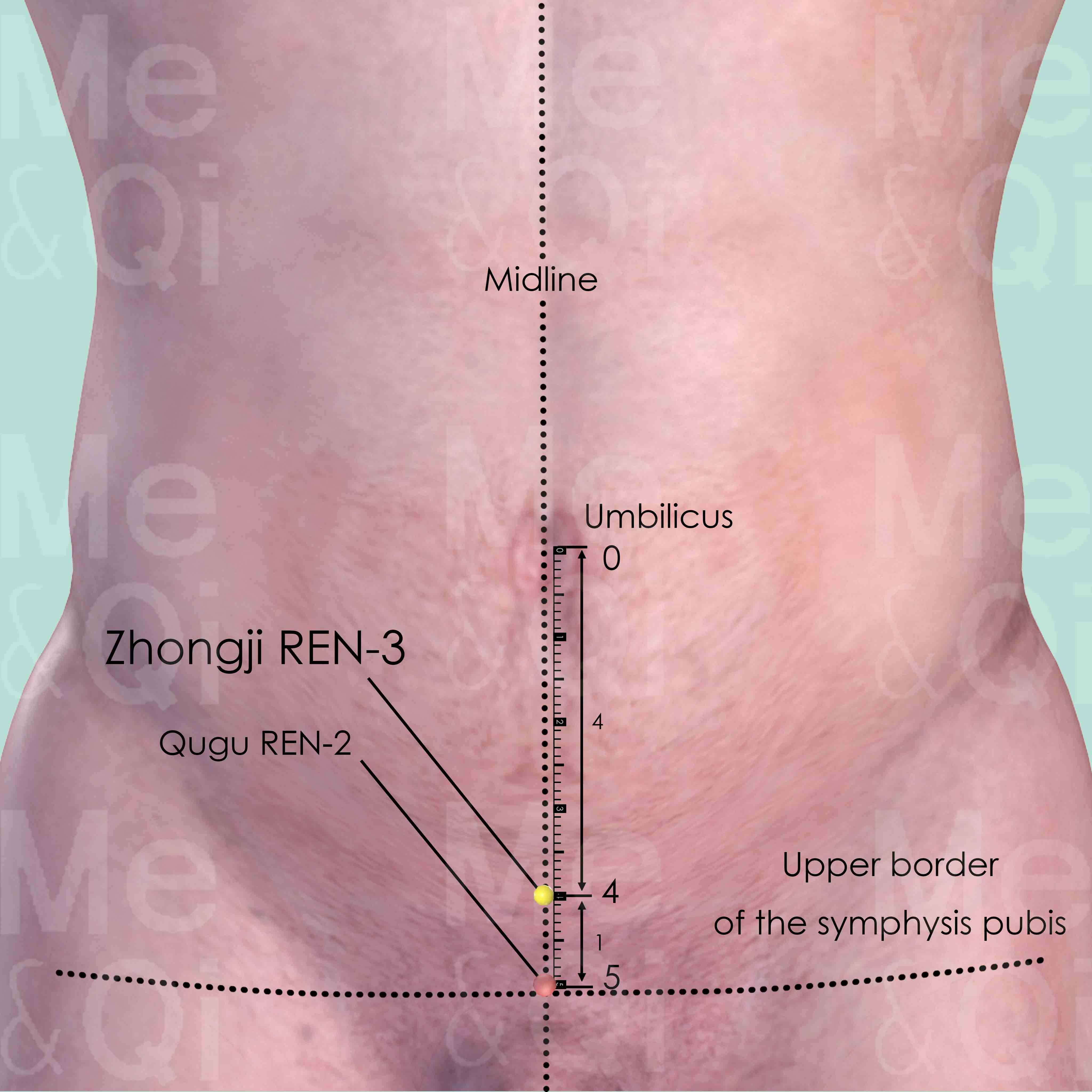
Zhongji REN-3
On the anterior midline, 4 cun below the umbilicus, 1 cun above Qugu REN-2, which is located at the upper border of the symphysis pubis.
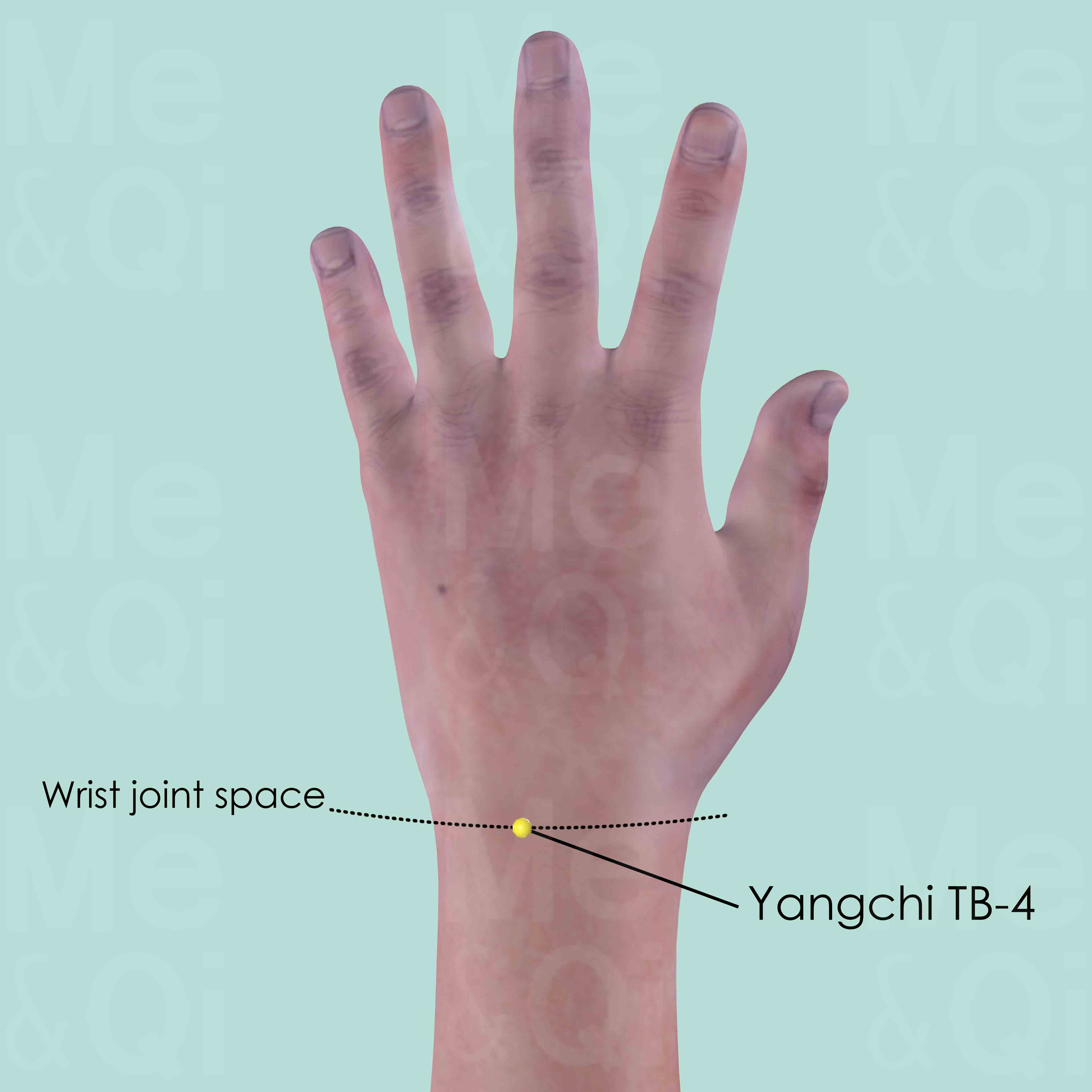
Yangchi TB-4
At the junction of the ulna carpal bones of the wrist dorsum, in the depression lateral to the tendon of extensor digitorum and extensor digiti minimi muscle.

